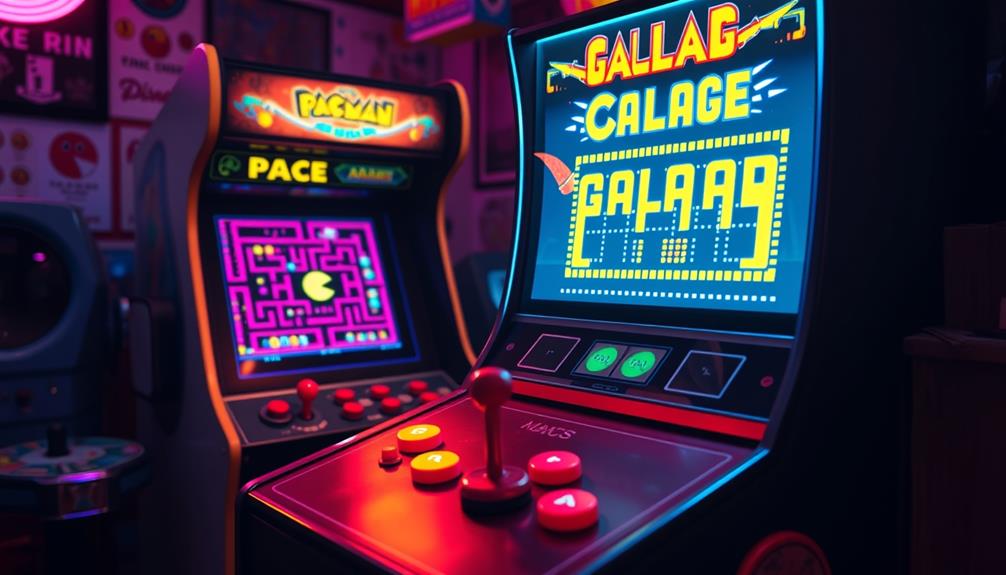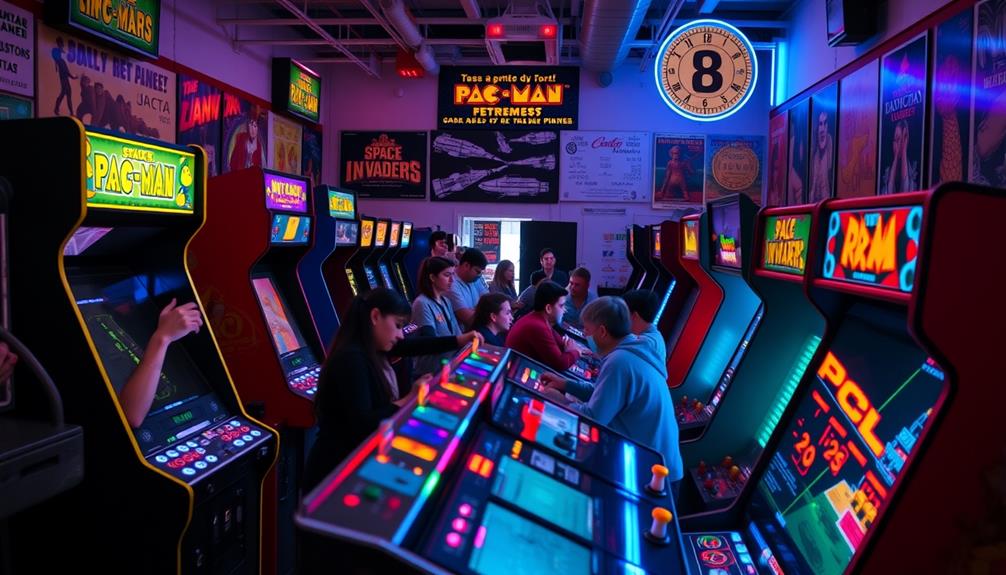An arcade game is a coin-operated machine that provides interactive entertainment in public spaces. These machines combine elements of video games and pinball, tailored for quick play sessions. They typically feature user-friendly controls and progressively increase in difficulty to keep players engaged. Some popular types of arcade games include video games, pinball machines, and redemption games that reward players with tickets for prizes. Since the late 20th century, arcade games have influenced social interactions and fostered a vibrant community. If you’re interested in the history and evolution of arcade games, there’s a wealth of information to discover! Understanding arcade game symbolism can provide valuable insights into cultural trends and societal values. For instance, the popularity of fighting games in the 1990s reflected a cultural fascination with martial arts and competition. Furthermore, the imagery and themes in arcade games often mirror the technological and cultural landscape of their time, offering a peek into the collective mindset of society. Delving into this aspect can enhance your appreciation for arcade games by adding a fascinating layer of depth. So, the next time you visit an arcade, take a moment to ponder the symbolism behind the games you play.
Key Takeaways
- Arcade games are coin-operated machines providing interactive entertainment in public spaces, designed for quick play sessions.
- They include various types, such as video games, pinball machines, and redemption games.
- Arcade games emphasize social interaction, contrasting with the solitary nature of home console gaming.
- They have evolved since the 1930s, with significant cultural impact and popularity peaking in the late 20th century.
- The industry has faced decline but continues to adapt through innovations like VR technology and the revival of classic titles.
Definition of Arcade Games
At their core, arcade games are coin-operated machines that provide interactive entertainment in public spaces. These machines offer a unique blend of video games and pinball machines, designed to engage players in quick play sessions.
You'll find them in amusement arcades, where the atmosphere buzzes with excitement and competition. Many of these machines have evolved over the years, incorporating modern technology integration to enhance the gaming experience and attract a new generation of players.
Arcade games gained immense popularity during the golden age, which spanned from the late 1970s to the 1980s. Iconic titles like Pac-Man and Space Invaders became cultural phenomena, drawing crowds enthusiastic for a challenge.
Each game is characterized by intuitive controls, making it easy for anyone to jump in and start playing.
What sets arcade games apart is their escalating difficulty, which keeps you coming back for more. As you master the game, it becomes increasingly challenging, compelling you to improve your skills.
The coin-operated format distinguishes arcade games from home console games, emphasizing the social aspect of gaming in public places. Whether you're playing a classic video game or a modern electro-mechanical game, the thrill of arcade gaming remains a timeless experience.
Types of Arcade Games

Arcade games come in various types, each offering a unique gaming experience that caters to different preferences. One popular category is video arcade games, which gained fame in the 1970s with classics like Pong and Space Invaders. These games are typically housed in arcade cabinets and provide a digital experience that many players love.
The evolution of arcade games has also led to the emergence of sophisticated options like pinball machines, which are often celebrated for their exciting gameplay and impressive designs as seen in the best rated pinball machines of 2024.
Another type you might enjoy is redemption games, such as Skee-Ball, where you earn tickets based on your score, which can be exchanged for prizes—an enticing feature for many players.
Don't forget about electro-mechanical games, like Periscope, that combine electronic and mechanical elements for interactive play.
If you're in Japan, you might encounter Pachinko, a game blending recreation and gambling, showcasing the cultural significance of arcade gaming in different regions.
Historical Development

From their origins in 19th-century amusement parks, arcade games have evolved considerably over the decades. The historical development of arcade games showcases a fascinating journey from simple skill-based attractions to complex video games that we understand today.
Here's a brief overview of key milestones:
| Year | Development | Impact |
|---|---|---|
| 1933 | Introduction of pinball machines | Shifted perception from luck to skill |
| 1947 | Invention of flippers | Enhanced gameplay and skill engagement |
| Mid-20th Century | Rise of electro-mechanical games | Combined mechanical and electronic play |
| 1972 | Launch of "Pong" | Marked the start of arcade video games |
The mid-20th century saw a technological renaissance that paved the way for the Golden Age of arcade games, roughly from 1978 to 1982. Iconic titles like "Space Invaders" and "Pac-Man" emerged, solidifying the arcade's cultural significance and boosting the arcade industry to an impressive $8 billion by 1981. Consequently, the evolution of arcade games since their inception highlights a blend of innovation and entertainment that continues to resonate today.
Skill vs. Chance Games

The evolution of arcade games has led to a clear distinction between skill and chance games, each offering a unique gaming experience.
Skill-based games, like pinball machines and Skee-Ball, rely heavily on your player performance. Pinball machines, known for their dynamic gameplay with elements like flippers and bumpers, exemplify how technique directly influences the outcome, rewarding you for your efforts. The mechanics of pinball machines showcase the intricate design that enhances player interaction.
On the other hand, chance-based games, such as slot machines, depend on random outcomes, leaving your success to luck rather than skill.
Redemption games blend these elements, allowing you to earn tickets or points based on your performance that can be exchanged for prizes, adding a layer of excitement to the experience.
The regulatory status of arcade games varies by region, often hinging on whether a game is classified as primarily skill-based or chance-based. This classification impacts its legality, with skill-based games generally facing fewer restrictions.
Historically, pinball machines were sometimes considered gambling devices until advancements like the electric flipper established them as skill-based games. This shift not only changed perceptions but also emphasized how player performance can shape the arcade gaming landscape.
Understanding these differences enriches your appreciation of the diverse world of arcade games.
Cultural Impact and Trends

Often overlooked, the cultural impact of arcade games has shaped social interactions and entertainment trends for decades. These games became a cultural phenomenon in the late 20th century, especially with titles like Street Fighter II that encouraged competitive gameplay, fostering community among players.
The evolution of gaming, including the rise of luxury cruises as a unique form of entertainment, reflects a broader shift in how people seek immersive experiences. However, you've likely noticed the decline of arcades, particularly in Japan, where the number dropped from 26,000 in 1986 to just 4,000 in 2019. This shift highlights the rise of home gaming systems that changed how people engage with games.
The COVID-19 pandemic further exacerbated this decline, leading to the closure of many beloved establishments. As a result, the arcade industry has had to adapt to modern entertainment competition.
Today, arcade games continue to influence contemporary video game design and mechanics, contributing greatly to the rise of competitive gaming and esports.
Current trends show a revival of classic arcade titles in modern formats, along with innovations like virtual reality technology. You might enjoy visiting arcade bars, which blend gaming with social experiences, proving that while the landscape may shift, the spirit of arcade gaming continues to thrive.
Frequently Asked Questions
What Is the Exact Meaning of Arcade?
When you think of "arcade," it conjures images of lively venues filled with coin-operated games. These spaces foster social interaction, offering quick, interactive gameplay that brings back nostalgic memories for many gamers.
Why Is It Called Arcade Games?
Arcade games are called that because they're the ultimate social playgrounds, where you insert coins for thrilling moments! They originated in amusement arcades, emphasizing communal play and a unique experience separate from home gaming.
What Is the Purpose of Arcade?
The purpose of arcade games is to entertain you through interactive gameplay. They offer quick play sessions, foster community interactions, and create competitive environments, making them perfect for social gatherings and casual fun with friends.
Are Arcade Games Like Gambling?
Arcade games aren't like gambling. You engage your skills to win tickets or prizes, while gambling relies on luck and often involves monetary stakes. Though some games mimic gambling, they focus more on entertainment and interaction.
Conclusion
Arcade games are more than just pixels on a screen; they're gateways to nostalgia and fun. Think of them like a time machine, transporting you back to simpler days, where every coin dropped felt like a step into adventure. With millions of players around the world, these games create a vibrant tapestry of shared experiences. So, whether you're chasing high scores or just enjoying the vibrant lights, remember: every game is a new journey waiting to unfold.









